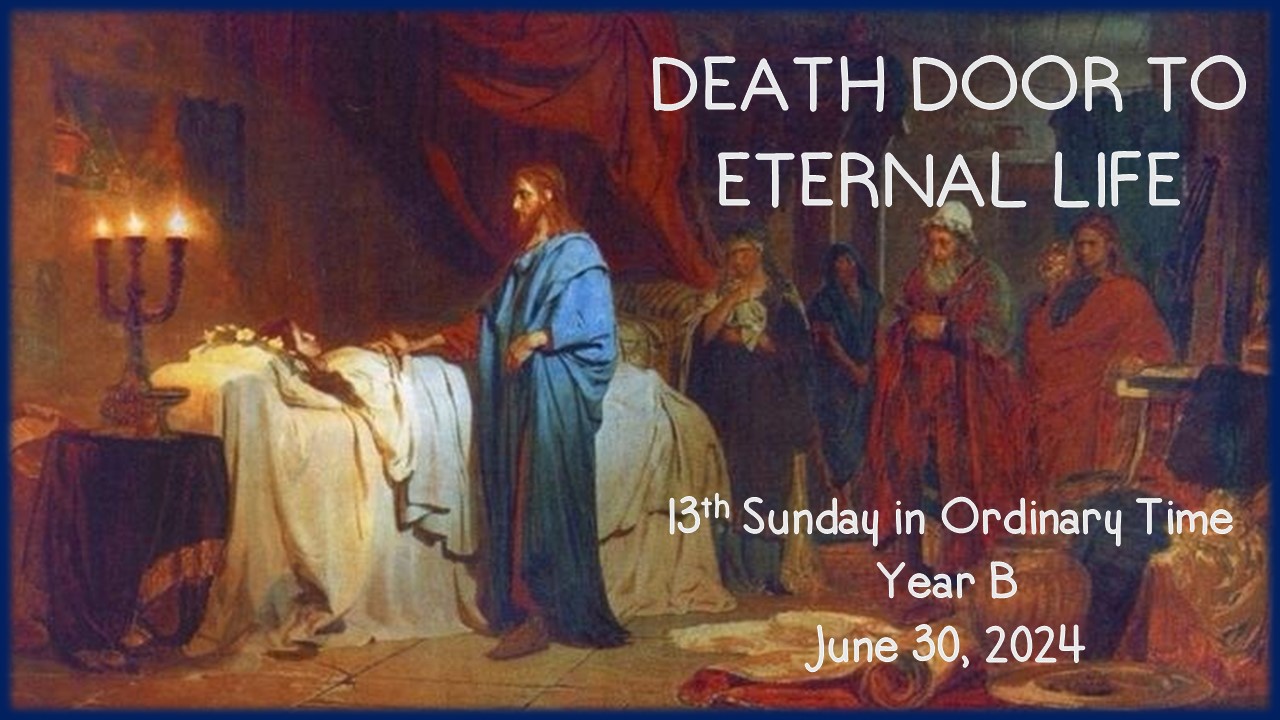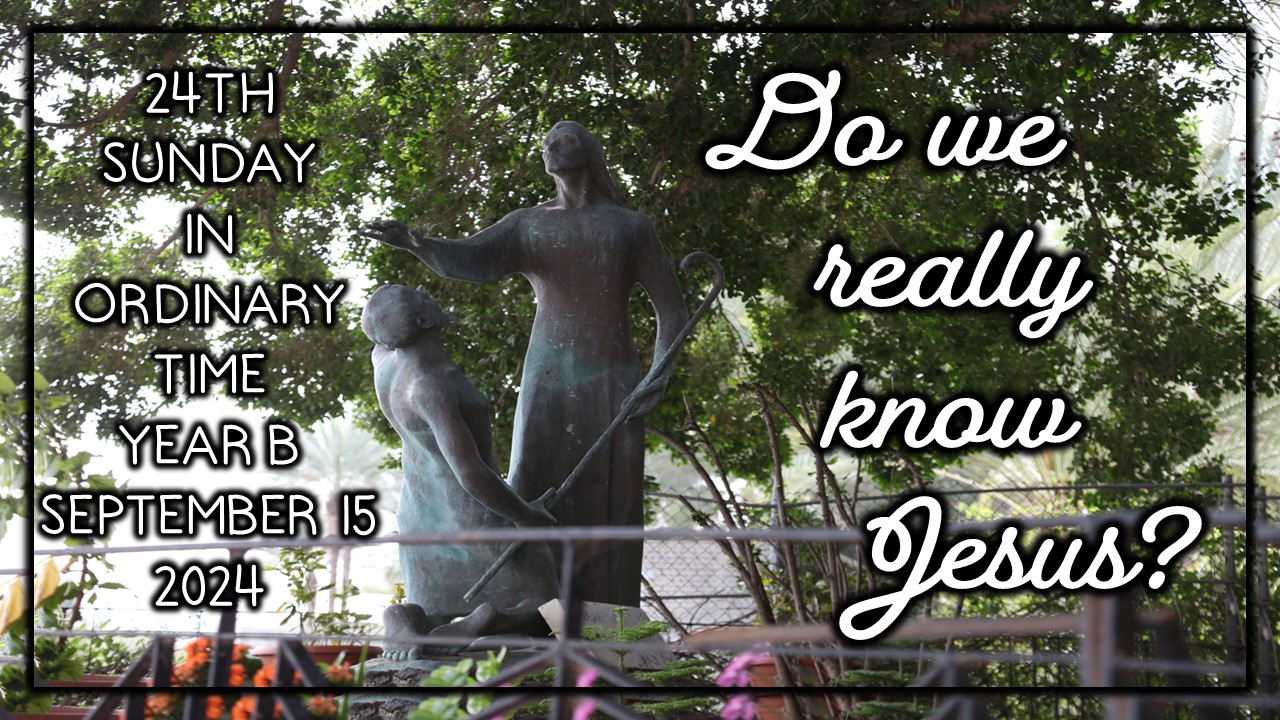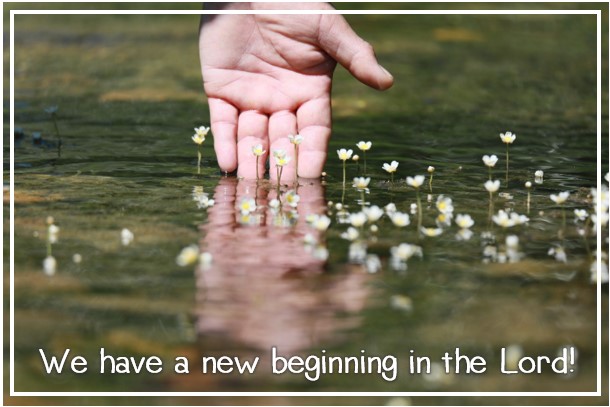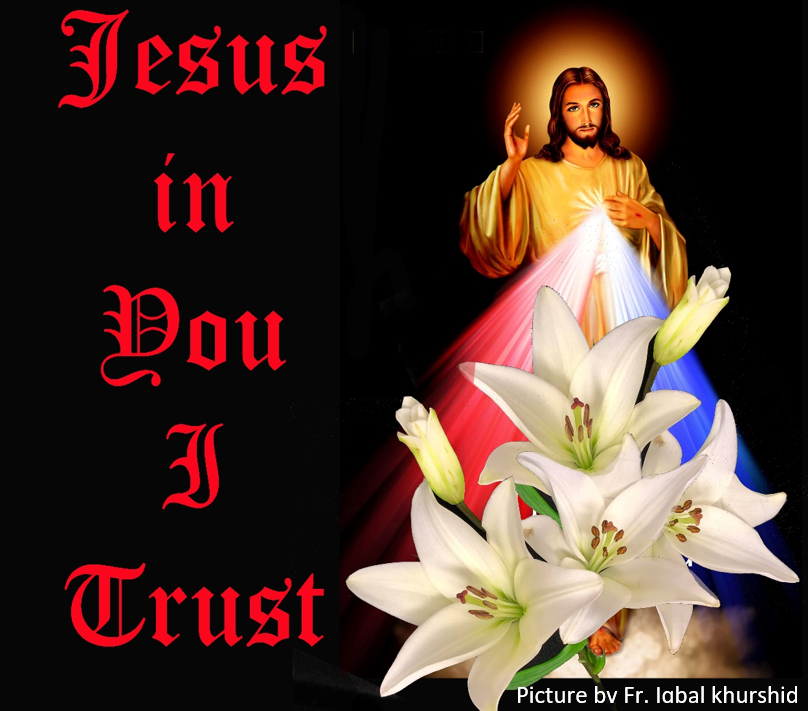
13TH SUNDAY IN ORDINARY TIME YEAR B ~ JUNE 30, 2024
DEATH DOOR TO ETERNAL LIFE
A sick man turned to his doctor as he was preparing to leave the examination room and said, “Doctor, I am afraid to die. Tell me what’s on the other side,” Very quietly, the doctor said, “I don’t know…” “You don’t know? You’re a Christian Man, and don’t know what’s on the other side?” The doctor was holding the handle of the door; on the other side came a sound of scratching and whining, and as he opened the door, a dog sprang into the room and leaped on him with an eager show of gladness and love.
Turning to the patient, the doctor said, “Did you notice my dog? He has never been in this room before. He did not know what was inside. He knew nothing except that his master was here, and when the door opened, he sprang in without fear. I know little of what is on the other side of death, but I do know one thing…I know my Master is there and that is enough.”
Faced with death, life might seem absurd and meaningless. But our Christian faith tells us that despite death, life is not absurd and meaningless. Life for each of us took on a completely different meaning when our parents decided to have us baptized into the Catholic Church. When we were baptized, we became adopted sons and daughters of God. When we were baptized, this planet was no longer our home, and then heaven became our true homeland. When we were baptized, we were no longer on our own. When we were baptized, we were joined with Jesus in leaving behind an old life and beginning a new life. When Jesus died, he left his old life behind him. He rose from the dead, having left behind life in a human body like ours. When we were baptized, we joined Jesus in his dying, leaving behind our old self, and we joined Jesus in his resurrection, becoming new persons. Part of Paul’s letter to the Romans talks of this (Rom 6). When we were baptized in Christ Jesus we were baptized in his death. In other words, when we were baptized, we went into the tomb with him and joined him in death, so that as Christ was raised from the dead by the Father’s glory, we too might live a new life. In every Mass we remember that we share in Jesus’ death and resurrection, for example “We proclaim your Death, O Lord, and profess your Resurrection until you come again.” “When we eat this bread and drink this Cup, we proclaim your Death, O Lord, until you come again.”
Because our entire life is living out our baptism, because we want to live our entire lives in such a way that our baptism has a lasting effect on our lives, we are continually trying to leave behind sin and selfishness to become better people. When we respond at each moment of our lives to the call of God, we prepare ourselves to enter the Lord’s rest. As baptized, we try to be aware of the presence of God in each moment of our lives, like the sunflower that keeps following the sun all day long. God is not just at the end of our life, waiting for us there. God is with us at every moment of our lives. However, in the final moment of our lives when we pass from death to eternal life, we will see God’s love and everlasting light like never before during this life. In this Eucharist, we pray that perpetual light may shine upon us.
We bury someone in a cemetery which contains people of different faiths, a further reminder to us is that it is we who create differences, not God, because there is only one heaven. I have never yet heard anybody say there is a different heaven for each faith. The fact that we all die is yet another reminder to us that we are all the same before God. No matter how much we owned or possessed, when it comes to the end we are all the same.
Paul said that our homeland is in heaven (Phil 3:20). We build houses for ourselves. We decorate them. We become settled in life. Very few people like moving around from one place to another. And yet despite the fact that we are so settled where we are, “For us, our homeland is in heaven.” We might think we are at home here, but if we have faith we can see beyond the surface of life and we know that we have been created to know, love and serve God. In the Book of Leviticus, we read “The land shall not be sold in perpetuity, for the land is mine; with me you are but aliens and tenants” (25:23).
Saint Gregory of Nyssa, bishop says that the life of the Christian has three distinguishing aspects: deeds, words and thought. Thought comes first, then words, since our words express openly the interior conclusions of the mind. Finally, after thoughts and words, comes action, for our deeds carry out what the mind has conceived. So, when one of these results in our acting or speaking or thinking, we must make sure that all our thoughts, words and deeds are controlled by the divine ideal, the revelation of Christ. For then our thoughts, words and deeds will not fall short of the nobility of their implications. What then must we do, we who have been found worthy of the name of Christ? Each of us must examine his thoughts, words and deeds, to see whether they are directed toward Christ or are turned away from him. This examination is carried out in various ways. Our deeds or our thoughts or our words are not in harmony with Christ if they issue from passion. They then bear the mark of the enemy who smears the pearl of the heart with the slime of passion, dimming and even destroying the luster of the precious stone. On the other hand, if they are free from and untainted by every passionate inclination, they are directed toward Christ, the author and source of peace. He is like a pure, untainted stream. If you draw from him the thoughts in your mind and the inclinations of your heart, you will show a likeness to Christ, your source and origin, as the gleaming water in a jar resembles the flowing water from which it was obtained. For the purity of Christ and the purity that is manifest in our hearts are identical. Christ’s purity, however, is the fountainhead; ours has its source in him and flows out of him. Our life is stamped with the beauty of his thought. The inner and the outer man are harmonized in a kind of music. The mind of Christ is the controlling influence that inspires us to moderation and goodness in our behavior. As I see it, Christian perfection consists in this: sharing the titles which express the meaning of Christ’s name, we bring out this meaning in our minds, our prayers and our way of life”.
“I don’t want to die” are words we hear almost everyday because I believe for two reasons: First we don’t want to lose what we have including our families and properties etc., and secondly is our attachment to the world. This statement is also very strange on the other hand because most people who believe there is life after death, are still afraid of death. “We are neither eternal nor ephemeral: we are men and women on a journey in time, time that begins, and time that ends.” Pope Francis invited everyone “to pray, and to ask for the grace of a sense of time” in order not to be “imprisoned” by the present moment, “closed in on oneself.” Death, the Pope said, “is a fact that affects everyone.” For some it comes later, for some sooner, “but it comes.” As it is also written in the Book of Sirach (38:22) “Remember his fate, for yours is like it; yesterday it was his, and today it is yours”.
But there is the temptation of the present moment that takes hold of life and brings you to go wandering in this selfish maze of the moment, without a future, always coming and going, coming and going, no? And the journey ends in death, we all know that. And for this reason, the Church has always tried to reflect on this our end: not death.”
It is helpful, Pope Francis said, to repeat often, “I am not the master of time,” because this reflection “saves us from the illusion of the moment, of viewing life like a chain with links made up of individual moments,” a transitory life “that makes no sense.” We say to ourselves, “I am on a journey, and I have to look forward”; but, the Pope said, we should also consider that “death is a legacy,” – not a material inheritance, but a legacy of memory. In the Book of Leviticus, it is written “The land shall not be sold in perpetuity, for the land is mine; with me you are but travellers and tenants”. I think is the way of our life is though short lived, but we must live in and with the Lord.
And so, we should ask ourselves: “What would be my legacy if God were to call me today? What legacy would I leave as a testimony of my life?” It is a good question to ask ourselves. And thus, we can prepare ourselves, because each one of us… none of us will remain “as a relic.” We must all go down this path.
Finally, the Pope said, “death is a memory,” an “anticipated memory” to reflect upon: When I die, what would I like to have done in this decision that I must make today, in my way of living today? It is an anticipated memory that illuminates the “moment” of today, illuminating with the fact of death the decisions that I must make every day.
A fellow was stuck on his rooftop in a flood. He was praying to God for help.
Soon a man in a rowboat came by and the fellow shouted to the man on the roof, “Jump in, I can save you.”
The stranded fellow shouted back, “No, it’s OK, I’m praying to God, and he is going to save me.”
So, the rowboat went on.
Then a motorboat came by. “The fellow in the motorboat shouted, “Jump in, I can save you.”
To this the stranded man said, “No thanks, I’m praying to God, and he is going to save me. I have faith.”
So, the motorboat went on.
Then a helicopter came by, and the pilot shouted down, “Grab this rope and I will lift you to safety.”
To this the stranded man again replied, “No thanks, I’m praying to God, and he is going to save me. I have faith.”
So, the helicopter reluctantly flew away.
Soon the water rose above the rooftop and the man drowned. He went to Heaven. He finally got his chance to discuss this whole situation with God, at which point he exclaimed, “I had faith in you, but you didn’t save me, you let me drown. I don’t understand why!”
To this God replied, “I sent you a rowboat and a motorboat and a helicopter, what more did you expect?”
St. Aloysius Gonzaga who was infected with the plague in Italy while helping other people and died at the age of 23. He wrote a letter to his mother encouraging her to be sad and afraid but believe in the Lord: “May the comfort and grace of the Holy Spirit be yours for ever, most honored lady. Your letter found me lingering still in this region of the dead, but now I must rouse myself to make my way on to heaven at last and to praise God for ever in the land of the living; indeed, I had hoped that before this time my journey there would have been over. If charity, as Saint Paul says, means to weep with those who weep and rejoice with those who are glad, then, dearest mother, you shall rejoice exceedingly that God in his grace and his love for you is showing me the path to true happiness, and assuring me that I shall never lose him.
The divine goodness, most honored lady, is a fathomless and shoreless ocean, and I confess that when I plunge my mind into thought of this it is carried away by the immensity and feels quite lost and bewildered there. In return for my short and feeble labors, God is calling me to eternal rest; his voice from heaven invites me to the infinite bliss I have sought so languidly and promises me this reward for the tears I have so seldom shed.
Take care above all things, most honored lady, not to insult God’s boundless loving kindness; you would certainly do this if you mourned as dead one living face to face with God, one whose prayers can bring you in your troubles more powerful aid than they ever could on earth. And our parting will not be for long; we shall see each other again in heaven; we shall be united with our Savior; there we shall praise him with heart and soul, sing of his mercies for ever, and enjoy eternal happiness. When he takes away what he once lent us, his purpose is to store our treasure elsewhere more safely and bestow on us those very blessings that we ourselves would most choose to have.
I write all this with the one desire that you and all my family may consider my departure a joy and favor and that you especially may speed with a mother’s blessing my passage across the waters till I reach the shore to which all hopes belong. I write the more willingly because I have no clearer way of expressing the love and respect, I owe you as your son”.
Death is painful, hurtful, heartbreaking and damaging and no wants to see anyone dying but the Sacred Scripture says, “anyone who is born, must taste death”. In the Book of Song of Songs, we read “Love is as strong as death is” and the Book of Ecclesiastes reminds us with these words “There is a time for everything under the sun, a time to be born and a time to die…”. However, for us who believe in the Lord we do know that death is not the end, but the beginning of gain eternal life and First Reading is right to explain “God didn’t not make death, and he doesn’t not delight in the death of the living. For he created all things so that they might exist; the generative forces of the world are wholesome, and there is no destructive poison in them, and the dominion of Hades is not on earth. For righteousness is immortal”.
In the Gospel we could fee the pain of the father who didn’t want his young daughter to die and comes to the Lord. Why he came to Jesus?
- First, he knew that Jesus has the power to heal and give life. Martha in the like manner believed in Jesus “if you were here, my brother wouldn’t have died but still, I believe that whatever you will ask God, he will give you”.
- He overheard the news that his daughter has died but kept walking with the Lord who told him “Do not fear, only believe”.
- He saw in spite of the unbelief of many, Jesus held the hand the of the young daughter and rose her up from the death bed to life.
Looking at the faith of the father in Jesus we can understand how important his presence is in our lives. St. Paul keeps reminding us to believe in him “if we have died with him, we will also rise with him”. Like a father in the Gospel, we must have firm faith in the Lord who says “Do not let your hearts be troubled, believe in God, believe also in me” because he is the way, the truth, and the life. He is life and the resurrection. Death is not the end but beginning of “The Best is yet to come”.
“There was a young woman who had been diagnosed with a terminal illness and had been given three months to live. As she was getting her things ‘in order,’ she contacted her Pastor and had him come to her house to discuss certain aspects of her final wishes.
She told him which songs she wanted sung at the service, what scriptures she would like read, and what outfit she wanted to be buried in. Everything was in order and the Pastor was preparing to leave when the young woman suddenly remembered something very important to her.
‘There’s one more thing,’ she said excitedly.
‘What’s that?’ came the Pastor’s reply.
‘This is very important,’ the young woman continued. ‘I want to be buried with a fork in my right hand.’
The Pastor stood looking at the young woman, not knowing quite what to say.
‘That surprises you, doesn’t it?’ the young woman asked.
‘Well, to be honest, I’m puzzled by the request,’ said the Pastor.
The young woman explained. ‘My grandmother once told me this story, and from that time on I have always tried to pass along its message to those I love and those who are in need of encouragement. In all my years of attending socials and dinners, I always remember that when the dishes of the main course were being cleared, someone would inevitably lean over and say, ‘Keep your fork.’ It was my favorite part because I knew that something better was coming, like velvety chocolate cake or deep-dish apple pie. Something wonderful, and with substance!’
‘So, I just want people to see me there in that casket with a fork in my hand and I want them to wonder, ‘What’s with the fork?!’ Then I want you to tell them: ‘Keep your fork. The best is yet to come.’
The Pastor’s eyes welled up with tears of joy as he hugged the young woman goodbye. He knew this would be one of the last times he would see her before her death. But he also knew that the young woman had a better grasp of heaven than he did. She had a better grasp of what heaven would be like than many people twice her age, with twice as much experience and knowledge. She KNEW that something better was coming.
At the funeral people were walking by the young woman’s casket and they saw the cloak she was wearing, and the fork placed in her right hand. Over and over, the Pastor heard the question, ‘What’s with the fork?’ And over and over, again he smiled.
During his message, the Pastor told the people of the conversation he had with the young woman shortly before she died. He also told them about the fork and about what it symbolized to her. He told the people how he could not stop thinking about the fork and told them they probably would not be able to stop thinking about it either. He was right.”
So, the next time you reach down for your fork let it remind you, ever so gently, that the best is yet to come. Friends are a very rare jewel, indeed. They make you smile and encourage you to succeed. Cherish the time you have, and the memories you share. Being friends with someone is not an opportunity, but a sweet responsibility.
And just remember…keep your fork!
The BEST is yet to come!”
Death is not easy to accept under any circumstances but on the other we must not allow death to get us down. In the Book of Sirach, we read how to let our tears fall of the deceased but not to injure ourselves with grief. (Please read Sirach 38:16-23).
Let us continue to pray for our deceased brothers and sisters and believe in the words of St. John “And I heard a voice from heaven saying, “Write this: Blessed are the dead who from now on die in the Lord.” “Yes,” says the Spirit, “they will rest from their labors, for their deeds follow them” (Revelation 14:13).
May the souls of all the faithful departed rest in the peace of Christ. Amen
Do we believe that death is a door to eternal life?
Other Sermons In This Series

24TH SUNDAY IN ORDINARY TIME YEAR B ~ SEPTEMBER 15, 2024
September 12, 2024

5th Sunday of Lent Year A ~ March 26, 2023
March 24, 2023

Divine Mercy Sunday Year C – April 24, 2022
April 22, 2022

